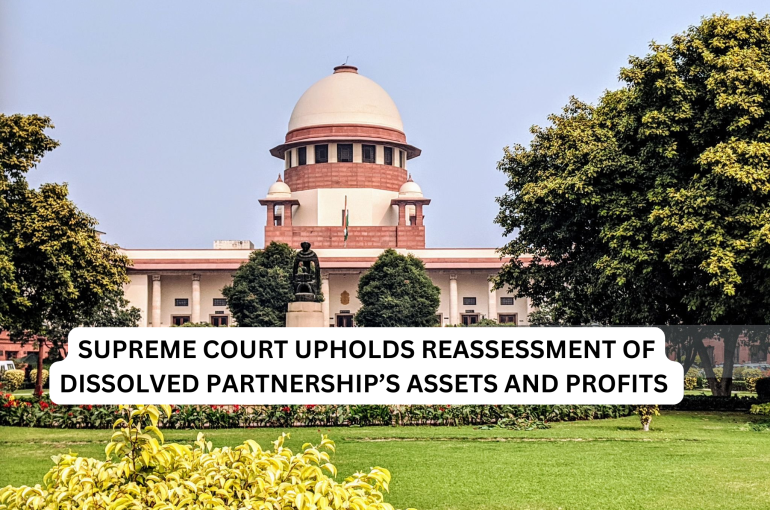SUPREME COURT UPHOLDS REASSESSMENT OF DISSOLVED PARTNERSHIP’S ASSETS AND PROFITS
Facts:
The Partnership Firm Crystal Transport Service was established in 1971 with four partners, including Fathima Fareedunisa (the Plaintiff) and three other partners, each holding a one-fourth share. In 1978, the Plaintiff filed a suit for the dissolution of the Partnership, settlement of accounts, and the appointment of a receiver to manage Firm assets until final winding up. She claimed that the other partners transferred Firm assets to Crystal Transport Pvt. Ltd. (Defendant 4) without her consent and refused her access to financial records.
The trial court dissolved the Firm effective 7.10.1978, and ruled that the Plaintiff held a one-fourth share. It ordered a final accounting of the Firm’s assets up to the dissolution date and directed Defendants 1–3 to submit detailed, audited financial statements. The trial court, however, dismissed the suit against Crystal Transport Pvt. Ltd. (Defendant 4) at this stage.
Dissatisfied with the trial court’s handling, the Plaintiff appealed. In 1989, the High Court modified the dissolution date to 15.11.1978 (the date of suit initiation) and appointed a Commissioner to take accounts from 1971 to 1978. The Commissioner’s work was subsequently disrupted, necessitating multiple appointments of receivers, who faced various challenges in handling the Firm’s assets and records. Following procedural lapses, the High Court, in 2019, ordered a remand for a thorough review of accounts.
In 2004, the trial court issued a final decree awarding the Plaintiff a financial settlement for her one-fourth share, with interest, but denied her request to replace the Receiver. The Plaintiff appealed, claiming that the decree relied on unreliable reports without cross-examining the authors, and the High Court allowed the appeal, remanding the case to trial court for further evidence.
Issues:
1. Whether the Plaintiff, as a former partner, was entitled to share in profits made by the company post-dissolution due to the use of Firm assets.
2. Whether Defendants 1–3 provided sufficient and reliable accounting of the Firm’s assets and finances up to the dissolution.
3. Whether the Plaintiff was deprived of an opportunity to challenge the reports by cross-examining the receiver and authors of financial statements, which formed the basis of the final decree.
Appellant’s Arguments:
The Appellants argued that, as the Firm dissolved in 1978, they were only responsible for profits up to that date. They contended that holding the company liable for profits made after dissolution was unwarranted, especially as no Firm assets were used post-dissolution.
They asserted that once the Firm was dissolved on 15.11.1978, their obligations ended. Further, they argued that any liability beyond the dissolution date contradicted partnership law, which does not bind a dissolved entity to ongoing profit-sharing.
Respondent’s Arguments (Plaintiff’s Arguments):
The Plaintiff argued that Section 37 of the Indian Partnership Act entitled her to a share of profits made by the company after dissolution since Firm assets were still being used by Crystal Transport Pvt. Ltd. until final settlement.
The Plaintiff contended that the final decree was based on incomplete and unverified reports from the Receiver, without adequate cross-examination. She argued that the trial court overlooked her objections to the accounting reports, leading to an unreliable final assessment of her entitlements.
She claimed her right to due process was violated, as the court had not provided her the opportunity to question the auditors or the Receiver whose reports were relied upon.
Analysis by the Supreme Court:
The Supreme Court noted that Section 37 entitles an outgoing partner to profits derived from Firm assets post-dissolution until a final settlement is reached, unless a contrary agreement exists. In this case, since the preliminary decree recognized that Firm assets were used by Crystal Transport Pvt. Ltd., the Plaintiff could claim a share of these profits.
The Hon’ble Court highlighted procedural lapses in failing to allow cross-examination of the Receiver and auditors. Given the Plaintiff’s objections to the Receiver’s reports, the High Court’s decision to remand the case for a full evidentiary review was upheld.
The Court found that remanding the case to trial court for a comprehensive examination of records, along with opportunities for both parties to present further evidence, was necessary to ensure a fair assessment of assets and profits.
Judgment:
The Supreme Court upheld the High Court’s order to remand the case to the trial court, allowing both parties to introduce additional evidence and cross-examine the Receiver and Auditors. The Apex Court ruled that the Plaintiff could claim profits generated from the use of Firm assets post-dissolution until the final settlement. Both Appeals and cross-objections were disposed of, with parties directed to bear their own costs.
ASHITA
ASSOCIATE
THE INDIAN LAWYER & ALLIED SERVICES





































Leave a Reply